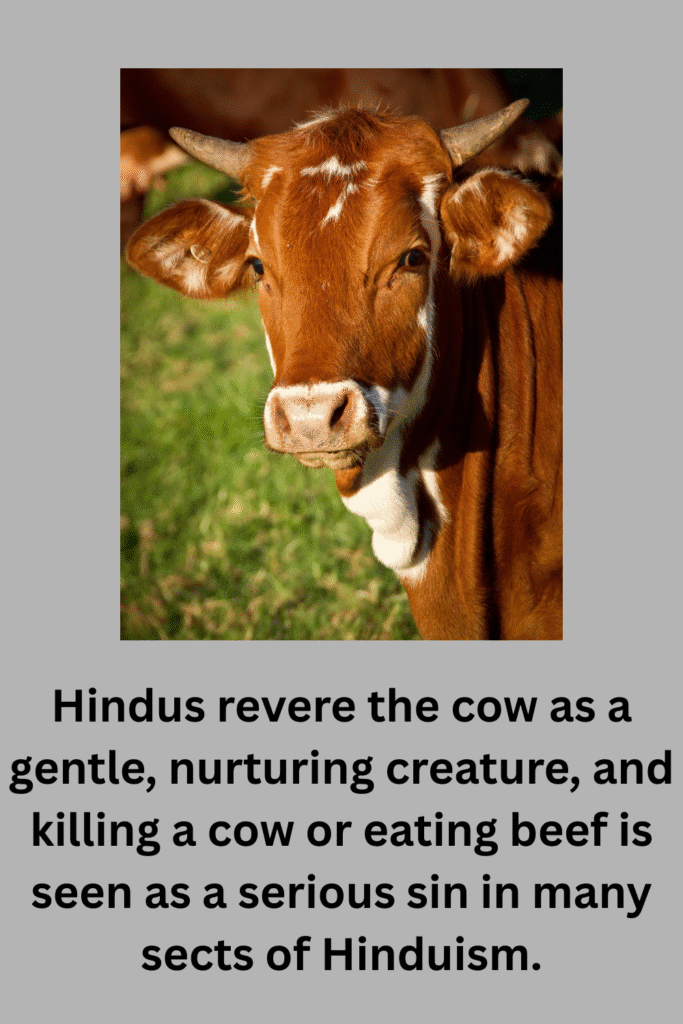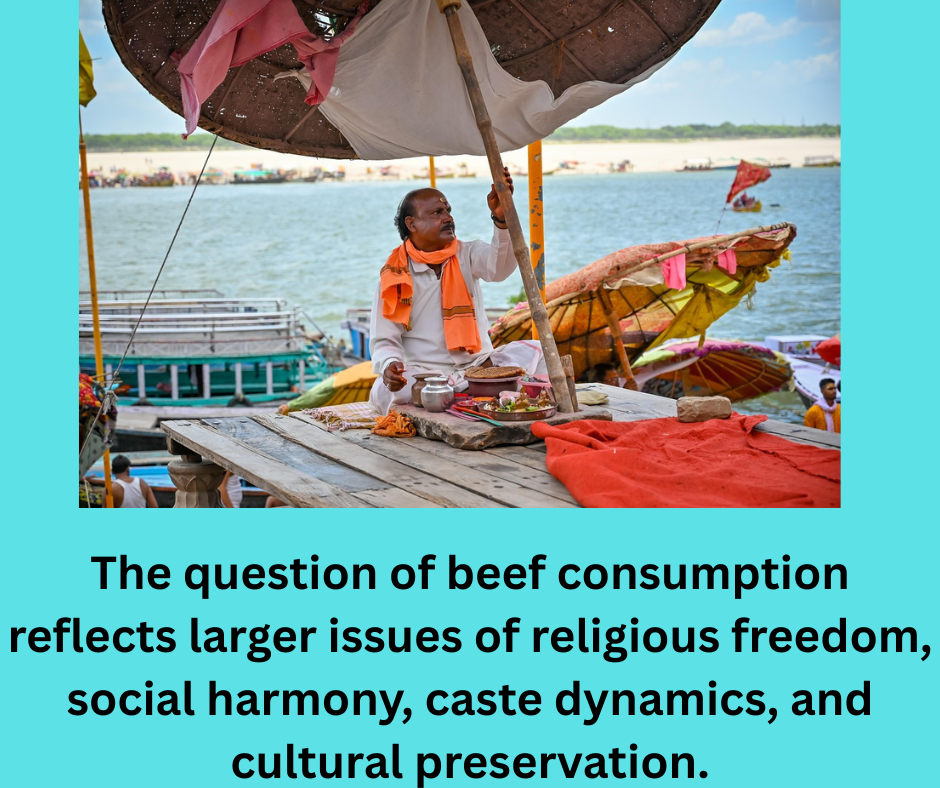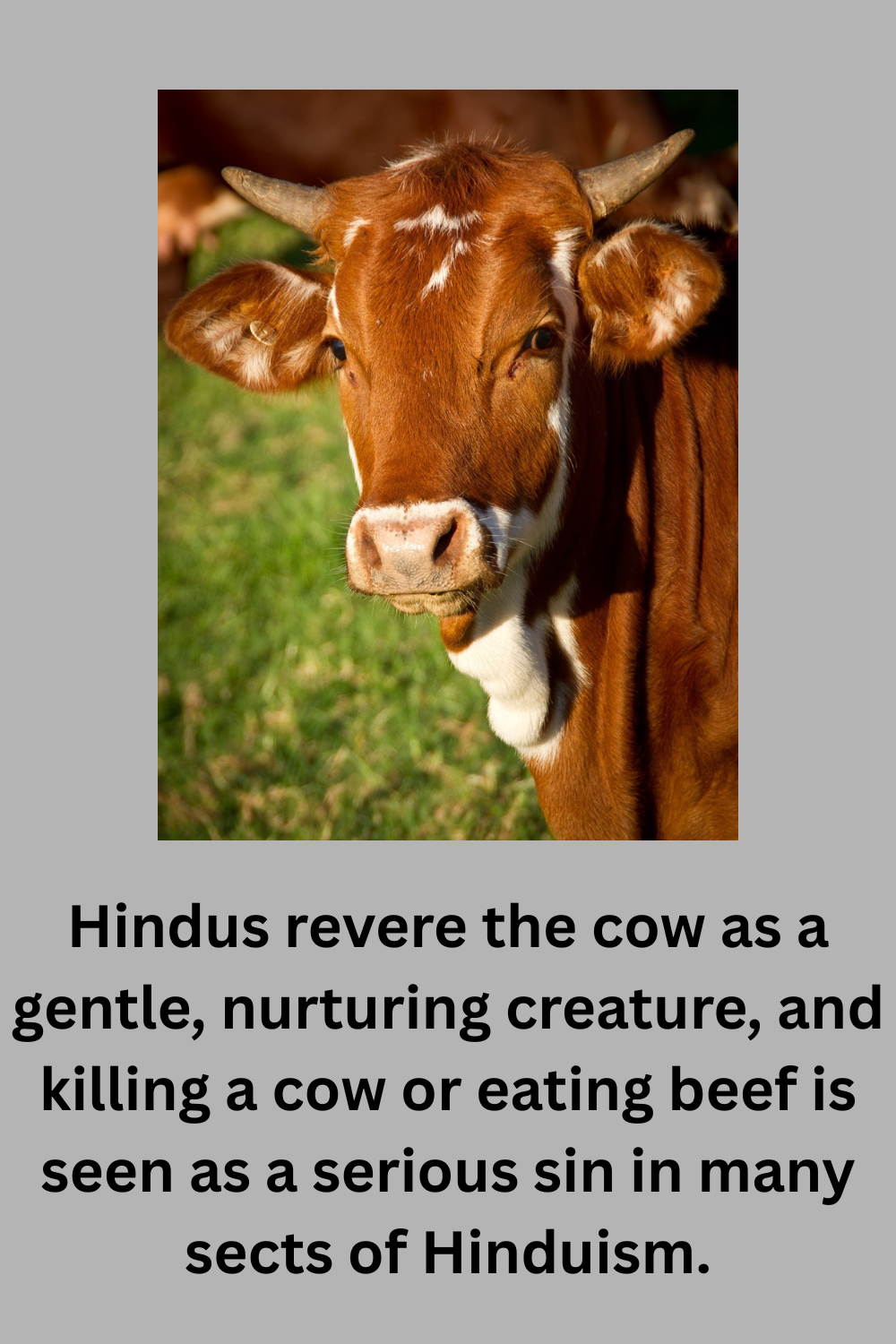India Hindu religion cannot eat beef religious diversity, cultural richness, and complex dietary traditions. Among the many questions people ask about religion and food in India, one that stands out is: The answer lies primarily in Hinduism, but other religious and cultural influences also contribute to India’s long-standing tradition of beef avoidance. This article explores which religions in India prohibit beef consumption, the reasons behind it, and how it affects Indian society today.

Table of Contents
Hinduism: The Major Religion That Avoids Beef
In India, Hinduism is the dominant religion, followed by nearly 80% of the population. religion cannot eat beef Hindus are well known for avoiding beef, and this tradition goes back thousands of years.
a. The Sacred Cow in Hinduism
- The cow is a sacred animal and a representation of life, motherhood, and kindness in Hinduism. It frequently goes hand in hand with:
- Goddess Kamadhenu: The divine, wish-fulfilling cow.
- • When Lord Krishna was younger, he was a cowherd.
- Dharma (righteousness): As cows provide milk, ghee, and dung (used for fuel and rituals) without harming others.
Hindus revere the cow as a gentle, nurturing creature, and killing a cow or eating beef is seen as a serious sin in many sects of Hinduism.
b. Scriptural References
Though early Vedic texts mention animal sacrifices, later scriptures like the Manusmriti and the Mahabharata encourage non-violence (Ahimsa) and condemn cow slaughter. Over time, avoiding beef became a core aspect of Hindu dharma.
2. Other Religions in India That Avoid Beef
While Hinduism is the primary religion associated with beef avoidance, several other Indian religions cannot eat beef also prohibit or discourage the consumption of beef.
a. Jainism
Jains follow a strict philosophy of Ahimsa (non-violence). They are pure vegetarians and avoid all forms of meat, including beef.
- Root vegetables, eggs, and even garlic and onions are forbidden to Jains.Beef is completely forbidden, not just because of cow worship, but because killing any animal goes against their core beliefs.
Jain monks and devout followers avoid even accidental harm to living beings, making their diet among the strictest in the world.
b. Buddhism (Indian Subcontinent)
In traditional Indian Buddhism, followers are encouraged to avoid harming living beings, which includes not eating meat.
- Though not all Buddhists are vegetarian, many Indian Buddhists avoid beef out of respect for Hindu cultural values and Ahimsa.
- In modern India, Ambedkarite Buddhists (followers of Dr. B.R. Ambedkar) may eat meat but often avoid beef due to social and political sensitivities.
c. Certain Christians and Tribal Groups
While Christianity does not prohibit beef, some Indian Christian communities, especially in states like Kerala, do consume beef. However, in many parts of India, local customs and Hindu influence have led even some Christian and tribal groups to avoid beef to maintain social harmony.
Muslims in India and Their Dietary Laws
Islam, the second-largest religion in India, permits beef consumption as long as the meat is halal (slaughtered according to Islamic law).
- However, due to religious tensions and local laws in certain Indian states, many Indian Muslims avoid eating beef publicly.
- In regions where beef bans are enforced, Muslim communities may face restrictions and even legal consequences for consuming or trading in beef.
While Islam does not prohibit beef, the Indian context makes this a sensitive issue for many Muslims.
Beef Bans in India: Legal and Political Dimensions
religion cannot eat beef In modern India, beef consumption is not only a religious issue but also a legal and political one.

a. State-Wise Beef Ban Laws
India does not have a nationwide ban on beef, but several states have strict laws against cow slaughter:
- Gujarat, Uttar Pradesh, Madhya Pradesh, Maharashtra, Rajasthan, and Haryana are among the states with total bans.
- States with Partial Ban: West Bengal, Kerala, Goa, and parts of the Northeast allow beef under certain conditions.
These bans are largely influenced by Hindu religious values and supported by conservative political groups.
b. Punishments and Enforcement
- Violating cow slaughter laws can lead to imprisonment, fines, and criminal charges.
- In some extreme cases, religion cannot eat beef people have faced mob violence or social boycotts over allegations of beef consumption.
This has led to significant debate over religious freedom, human rights, and food choices in a secular country.
Cultural Importance of Vegetarianism in India
India has the largest population of vegetarians in the world, and this is mainly due to Hindu, Jain, and Buddhist influence.
- Many Indian families follow lacto-vegetarian diets, consuming dairy but not meat or eggs.
- In traditional Brahmin households, even onion and garlic may be avoided due to their “tamasic” qualities (believed to dull the mind).
In such settings, beef consumption is unthinkable, and eating it may result in social stigma or exclusion from community events.
Caste and Beef: A Complex Social Equation
The relationship between beef and caste in India is also deeply layered.
a. Upper Castes and Brahmins
- Traditionally, upper-caste Hindus, especially Brahmins, avoid meat entirely, and beef is considered the most impure of all meats.
- Serving or eating beef in these circles is often seen as blasphemous.
b. Dalits and Adivasis
- Some Dalit (Scheduled Caste) and Adivasi (Tribal) communities have historically consumed beef as a cheap and accessible source of protein.
- However, these practices have often been marginalized, and Dalits have faced violence and discrimination over beef consumption.
- This gives the discussion an additional dimension of social inequity.
Modern Trends: Is the Taboo Changing?
In urban areas and among younger generations, dietary preferences are evolving.
- Some people are challenging traditional food taboos, including beef avoidance.
- Restaurants in cities like Mumbai, Kolkata, and Bengaluru serve beef, especially in communities where it is culturally accepted.
However, such trends are still limited to cosmopolitan environments, and most Indians — especially devout Hindus — continue to reject beef.
Conclusion:
So, what religion cannot eat beef in India?
The primary answer is Hinduism, where the cow is sacred and beef is strictly prohibited. religion cannot eat beef In addition:
- Jains avoid beef (and all meat) due to non-violence.
- Many Buddhists avoid beef, especially in the Indian cultural context.
- Muslims may eat beef, but face social and legal restrictions in some regions.
- Dalits and tribals have historical traditions of beef consumption, but these are often marginalized.
In India, food is not just about taste or nutrition — it is deeply tied to faith, identity, history, and politics. The question of beef consumption reflects larger issues of religious freedom, social harmony, caste dynamics, and cultural preservation.
Understanding why certain religions avoid beef helps promote respect and tolerance in a diverse and spiritually rich nation like India.
